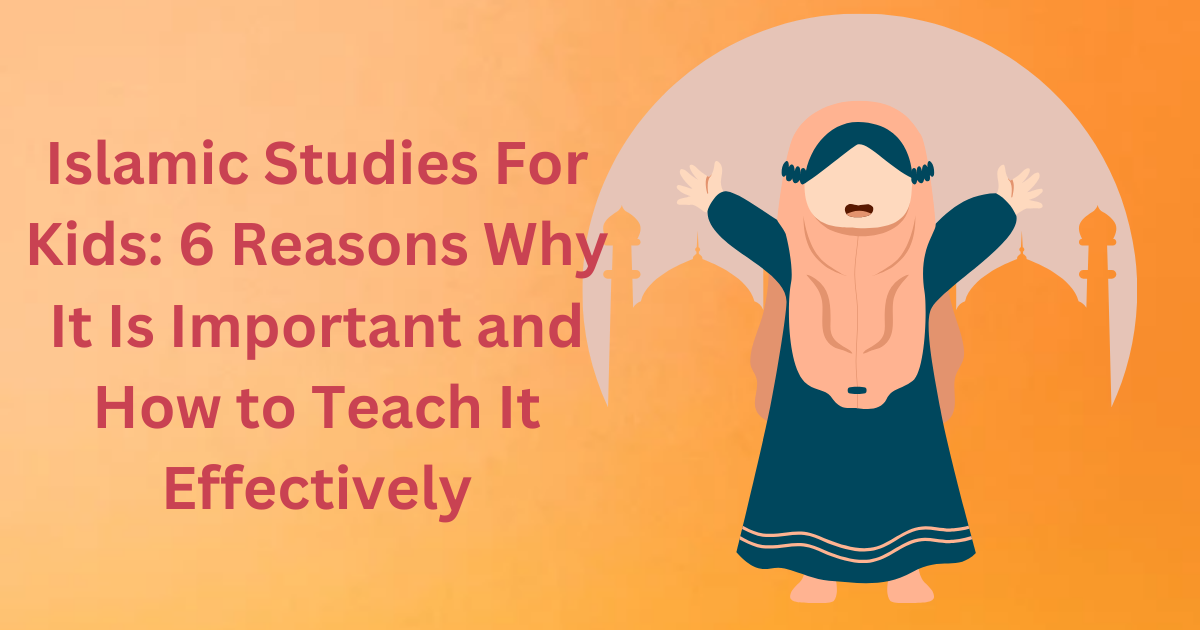Islamic Studies for kids is more than just imparting religious knowledge; it’s about shaping their character, nurturing their spirituality, and building a foundation that will guide them throughout their lives.
By weaving the teachings of the Quran and the traditions of Prophet Muhammad (peace be upon him) into their daily routines, we provide them with the tools to grow into compassionate, morally grounded individuals. In an ever-changing world, ensuring that our children understand and embrace their faith is essential to helping them lead purposeful, balanced lives.
Teaching Islamic studies to kids builds strong faith and morals. Using storytelling, visuals, and practical activities, kids learn about the Quran, Sunnah, and the five pillars of Islam.
Teaching young kids about Islam is one of our top priorities as Muslim parents. We need our kids to grow up having strong faith in God and the Quran. That can only happen if we build a strong foundation since they were young.
In this article, we will answer many questions I’m sure you had before as a parent. Like, What are the Islamic studies for kids? And why is teaching Islamic studies for kids important?
Table of Contents
What Are the Islamic Studies for Kids?
The definition of Islamic studies for kids is how to introduce Islam to your kids at a young age. We may say that Islamic studies are the teachings included in the Quran and the traditions (Sunnah) of Prophet Muhammad (peace be upon him). Also, Islamic studies is the foundation of our faith in Allah (Yaqeen)
Teaching Islamic studies to kids can come in very different forms depending on their age. But to call it Islamic studies we must teach them the five pillars of Islam. It’s all about teaching them to be good Muslims so they can become good humans.
Why Is Teaching Islamic Studies to Kids Important?
Teaching Islamic studies is important for kids because they need to learn about their faith and what’s right and wrong. Islamic studies help kids understand their beliefs better and learn to be kind, honest, and respectful.
1. Building a Strong Foundation of Faith:
Teaching Islamic Studies to kids is essential for building a strong foundation of faith. From an early age, children are introduced to the core beliefs and values of Islam, which shapes their understanding of their religion and the world around them.
By learning about the pillars of Islam, the articles of faith, and the teachings of the Quran and Hadith, children develop a deep connection with their Creator. This foundation helps them navigate life with a clear sense of purpose and guides their actions according to Islamic principles.
2. Instilling Moral and Ethical Values:
Islamic Studies play a vital role in instilling moral and ethical values in children. Through lessons on the life of the Prophet Muhammad (peace be upon him) and the stories of the prophets, children learn about compassion, honesty, patience, and justice.
These values are not just theoretical but are meant to be applied in their daily interactions. By understanding and practicing these virtues, children develop a strong moral compass that helps them make righteous decisions and treat others with kindness and respect.
3. Enhancing Identity and Belonging:
For Muslim children, learning about their religion enhances their sense of identity and belonging. Islamic Studies provide them with a clear understanding of their cultural and religious heritage, helping them to appreciate and take pride in their faith.
This knowledge fosters a sense of belonging to the global Muslim community (Ummah) and strengthens their connection to other Muslims. As a result, children are more likely to practice their religion confidently and resist the pressures of assimilating into cultures that may conflict with their beliefs.
4. Promoting Spiritual Growth and Connection:
Islamic Studies are integral to a child’s spiritual growth. Through prayer, recitation of the Quran, and learning about Islamic practices, children develop a personal relationship with Allah. This spiritual connection provides them with comfort, guidance, and a sense of peace, especially during challenging times. As they grow, this spiritual foundation continues to support them, encouraging them to seek solace and direction through their faith.
5. Preparing for a Balanced and Purposeful Life:
Islamic education prepares children for a balanced and purposeful life by teaching them the importance of both worldly and spiritual success. It emphasizes the need to balance academic achievements with religious obligations, such as prayer, fasting, and charity.
This holistic approach ensures that children grow up understanding the importance of contributing to society while staying true to their faith. It also helps them develop resilience and a positive outlook on life, knowing that their efforts are aligned with a higher purpose.
6. Contributing to Positive Character Development:
Lastly, teaching Islamic Studies to kids contributes significantly to their character development. The principles learned through Islamic education encourage children to become responsible, empathetic, and just individuals.
They learn the importance of fulfilling their duties to others, whether it’s towards family, friends, or the wider community. This strong character foundation not only benefits them personally but also prepares them to be positive contributors to society, upholding the values of justice, compassion, and integrity in all aspects of their lives.
What are the top Islamic studies subjects taught to kids?
The top Islamic studies subjects may vary depending on how old the kid is. Because for kids in Islam, there aren’t many obligations on them. However, they’re very obligated to “learn” everything because they won’t be young forever.
For instance, Kids are not obligated to pray until they’re 7 years old, but they should learn everything about “Salat” or Praying at an early age because this is something they are going to do for the rest of their lives.
So the main focus would be establishing a better mindset for young kids to aim to develop the kid’s spirit to include Islam as the only reference.
1. Islamic Jurisprudence (Fiqh)
By learning Fiqh, Kids will learn about the Islamic rituals which are the five pillars of Islam. And family relations, good manners in Islam, and Hygiene “Taharah” in Islam.
2. Islamic Creed (Aqidah)
One of the first questions my son asked me was, “ Where are the angels?”, “How did Allah create us?” and “How is the universe going to end?” These questions can get anyone confused even if they were adults, so imagine if your kid asked the wrong person and got the wrong answer that will form the fundamentals of their beliefs.
That’s why all Muslims are required to learn “Aqidah” As early as possible to know more about the Islamic beliefs related to the universe, including Allah, the angels, the holy books, the messengers, Judgement Day, and Predestination.
3. Islamic Sanctification (Tazkiyah)
Kids are recommended to learn practices recommended by the Prophet Muhammad, such as Dhikr, to purify their souls from harmful influences. These teachings are not only inspired by Sunnah but also by the Quran.
4. Hadith
Hadith is considered a rich topic that guides kids to the right path. By learning a complete record of the Prophet’s actions, sayings, and approvals, they will be able to follow into his footsteps and the footsteps of his companions.
5. Prophetic Biography (Seerah)
Every kid needs a role model. In this world, any celebrity can easily be a role model for a kid, especially for teen kids. But in Islam, Our one and only role model is Prophet Muhammed “Peace be upon him”.
So kids need to learn Seerah so they can take the prophet’s life as a reference to their own. You should focus on his life before and after receiving the message from Allah and Important events like the Hijrah (migration to Medina), Isra & Mi’raj (night journey and ascension).
6. Quran
We believe that teaching the Quran to kids at a young age is the lifetime gift you can give to your kid. Encouraging kids to explore the Quran helps them grow spiritually and learn important life lessons. These teachings can guide them on their faith journey. Discovering these interesting facts and information can be enriching and inspiring for them. It’s recommended to start the journey with specific Quranic fields:
A- Quran Recitation with Tajweed
Tajweed helps your kids learn the basics of pronouncing Quranic Arabic and the alphabet, ensuring they can read the verses correctly without mistakes.
B- Quran Memorization
Memorizing the Quran helps your kids be closer to God and strengthens their faith. The eternal reward for those who memorize The Quran is that they are promised an afterlife full of blessings in Jannah.
C- Quran Tafseer
To establish solid beliefs in Islam, Kids need to learn how to understand the Quran. There are different sources of Tafsir, where they link the verses (Ayat) that explain the required Ayah from the Quraan. And of course.
7. Islamic Ethics
If we want to raise our kids to be good people, We should raise them to be good Muslims according to Islamic ethics. And the good people part will follow for sure.
Learning about kindness and compassion, following the example of the Prophet Muhammad (peace be upon him), And many Islamic moral stories, helps kids become more empathetic and caring towards their communities. In Islam, you’re not only obligated to care about yourself and neglect others, but also, You’re obligated to help other people and leave the best influence on them.
How to Teach Islamic Studies to Kids?
There are many ways to teach Islamic studies to kids. Back in my days we only had the mosque where we could learn about Islam after Salat. But now there are endless ways to learn, considering that our kids these days are way different than we were.
Now most parents are heading to online learning platforms that can provide well-designed classes and highly qualified teachers so their kids can absorb the spirit of Islam through the following teaching methods.
1. Make Learning Fun and Engaging
To effectively teach Islamic Studies to kids, it’s essential to make the learning process fun and engaging. Incorporating interactive activities such as games, storytelling, and crafts can help children better understand and retain Islamic concepts.
For example, using visual aids like colorful charts to teach the Five Pillars of Islam or creating storybooks about the prophets can make the lessons more appealing. By making learning enjoyable, children are more likely to develop a genuine interest in their faith.
2. Integrate Islamic Teachings into Daily Life
Another effective way to teach Islamic Studies is by integrating Islamic teachings into daily life. Encourage children to apply what they learn in their everyday routines, such as saying “Bismillah” before eating, praying regularly, and helping others.
This practical application helps children see the relevance of their lessons and reinforces their understanding. Additionally, involving them in community activities like charity drives or attending Friday prayers can strengthen their sense of belonging and responsibility as Muslims.
3. Use Age-Appropriate Materials and Methods
It’s important to use age-appropriate materials and methods when teaching Islamic Studies to kids. Younger children may benefit from simple stories, songs, and interactive activities, while older children can handle more detailed discussions and projects.
Tailoring the content to their developmental stage ensures that they can grasp the concepts being taught. For instance, younger kids might enjoy learning Arabic letters through colorful puzzles, while older kids might engage with discussions on the moral lessons from the life of the Prophet Muhammad (peace be upon him).
4. Encourage Questions and Curiosity
Encouraging questions and curiosity is crucial when teaching Islamic Studies. Children naturally have many questions about the world around them, and providing a safe space for them to ask and explore Islamic teachings helps them develop a deeper understanding of their faith.
Be patient and open-minded, addressing their queries thoughtfully. This approach not only nurtures their curiosity but also strengthens their critical thinking skills and connection to Islam.
5. Set a Positive Example
Children often learn by observing the behavior of adults, so setting a positive example is one of the most powerful ways to teach Islamic Studies. Practice what you preach by demonstrating Islamic values in your actions, such as showing kindness, being honest, and praying regularly.
When children see these values in action, they are more likely to emulate them in their own lives. Being a role model reinforces the lessons you teach and helps instill a strong Islamic identity in your children.
6. Create a Supportive Learning Environment
Creating a supportive and nurturing learning environment is key to teaching Islamic Studies. Ensure that your home or classroom is a place where Islamic teachings are respected and valued. Provide access to resources like Islamic books, educational videos, and online platforms that offer Islamic lessons.
Additionally, praise and encourage children when they demonstrate understanding or practice what they’ve learned. A positive and encouraging atmosphere helps build their confidence and enthusiasm for learning about Islam.
7. Utilize Technology and Online Resources
In today’s digital age, technology can be a valuable tool in teaching Islamic Studies. There are numerous online resources, apps, and videos designed specifically for kids to learn about Islam in an interactive way.
Educational websites offer a variety of lessons on Quranic stories, Islamic history, and Arabic language skills. Incorporating these resources into your teaching can make the learning process more dynamic and accessible, especially for tech-savvy children.
8. Storytelling
Early Islamic events are history. But the history subject at school can be boring sometimes. Islamic History can never be. It’s all like an interesting novel but the difference here is that we believe in every word of it.
So teaching Islamic events depends on good storytelling that encourages kids to look for more information and details related to these great events. This helps the kids imagine and feel the sacrifice exerted for the triumph of Islam.
9. Visuals and Graphics
Nowadays kids and even adults can’t get off their phones. Everyone is fascinated and attracted by the visual content, especially kids who grow up watching TikToks or playing video games.
So, visual learning can be the easiest way to memorize any complicated piece of information about Islam by linking it with a visual illustration.
Learn the Quran Online With Bayan al-Quran Native Arab Tutors:
Embark on a transformative journey of Quranic learning with Bayan Al-Quran’s comprehensive online courses. Our platform offers an authentic and immersive experience tailored to learners worldwide. Whether you’re a beginner or seeking to enhance your skills, our Tajweed courses provide expert guidance and structured learning to master the art of Quranic recitation.
🎓 Expert Guidance:
Benefit from experienced instructors who specialize in Tajweed, breaking down complex rules into manageable segments for learners of all levels.
✨ Key Features:
Structured, step-by-step learning approach.
Access to high-quality instructional materials.
Real-time feedback from qualified tutors to enhance your practice.
Flexible learning schedules to accommodate your pace and convenience.
Immerse yourself in the melodious tones of Quranic recitation, enriching your spiritual experience.
🌟 Why Choose Bayan Al-Quran?
Join our vibrant community dedicated to perfecting Quranic recitation. Build a profound connection with the divine words of the Quran and enrich your spiritual journey. Choose Bayan Al-Quran for a transformative learning experience and embark on a path to mastering Tajweed with confidence.
You can also attend online Quran Classes with Bayan al-Quran with Native Arab tutors. There are also several courses that can help you in this regard.
Conclusion
In conclusion, teaching Islamic Studies to children is a vital and multifaceted process that lays the foundation for their spiritual and moral development. By introducing them to the teachings of the Quran, the traditions of Prophet Muhammad (peace be upon him), and core Islamic principles, we nurture their faith and help them grow into compassionate, ethical individuals.
Key subjects include Islamic Jurisprudence, Creed, Sanctification, Hadith, Prophetic Biography, Quranic studies, and Ethics. Effective methods include Arabic classes, discussions, storytelling, visuals, and practical exercises.
Utilizing age-appropriate methods, integrating Islamic teachings into daily life, and leveraging technology can make the learning process both engaging and effective. Ultimately, these efforts prepare children for a balanced and purposeful life, grounded in strong Islamic values and a deep connection to their faith.
















